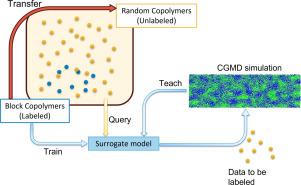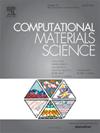利用基于不确定性的主动学习预测无规共聚物的机械性能
IF 3.1
3区 材料科学
Q2 MATERIALS SCIENCE, MULTIDISCIPLINARY
引用次数: 0
摘要
共聚物是我们日常生活中广泛使用的材料,它给靶向序列设计带来了巨大挑战。虽然计算模拟和数据科学的最新进展为解决这一复杂问题提供了一条大有可为的途径,但标签数据稀缺的挑战依然存在。在本研究中,我们引入了一个基于不确定性的主动学习框架,用于预测无规共聚物的特性。我们发现,在 1550 个数据点的设计空间中,主动学习策略只需标注 40 个数据点,大大减少了 97% 的标注工作。主动学习选择的大部分数据都位于设计空间的外围,从而将学习任务转化为插值问题。通过整合主动学习和分子动力学,我们成功地克服了共聚物序列设计中的组合爆炸问题,简化了数据标注过程,并最终建立了一个高精度模型。这项研究展示了数据科学在聚合物设计中的潜力,尤其是在面临数据稀缺的情况下。本文章由计算机程序翻译,如有差异,请以英文原文为准。

Mechanical property prediction of random copolymers using uncertainty-based active learning
The copolymer, a widely used material in our daily lives, presents a significant challenge in targeted sequence design. While recent advancements in computational simulation and data science offer a promising avenue for addressing this complex issue, challenges persist in labeled data scarcity. In this study, we introduce an uncertainty-based active learning framework for predicting the properties of random copolymers. We found that the active learning strategy allowed for labeling only 40 data points within the design space of 1550 data points, drastically reducing the labeling efforts by 97%. Most data selected by active learning were positioned on the design space’s periphery, transforming the learning task into an interpolation problem. Through integrating active learning and molecular dynamics, we successfully overcame the combinatorial explosion problem in copolymer sequence design, streamlining the data labeling process and culminating in a highly accurate model. This research demonstrates data science’s potential in polymer design, especially when facing data scarcity.
求助全文
通过发布文献求助,成功后即可免费获取论文全文。
去求助
来源期刊

Computational Materials Science
工程技术-材料科学:综合
CiteScore
6.50
自引率
6.10%
发文量
665
审稿时长
26 days
期刊介绍:
The goal of Computational Materials Science is to report on results that provide new or unique insights into, or significantly expand our understanding of, the properties of materials or phenomena associated with their design, synthesis, processing, characterization, and utilization. To be relevant to the journal, the results should be applied or applicable to specific material systems that are discussed within the submission.
 求助内容:
求助内容: 应助结果提醒方式:
应助结果提醒方式:


